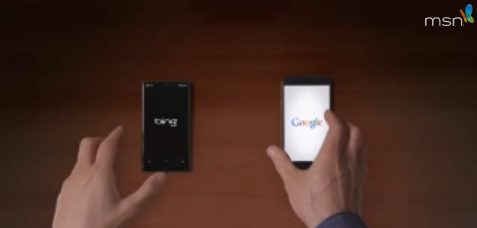 Our ability to translate between languages helps us communicate and connect to the world.
Our ability to translate between languages helps us communicate and connect to the world.
Every day millions of people and developers use Bing to instantly translate web pages from 95% of the world’s countries. Microsoft also launched a new Translator app for Office programs like Word and PowerPoint, which allow you to select any text and instantly translate it! In celebration of International Translation Day today, Microsoft has released another comical advertisement pitting Bing’s translation capabilities against Google’s:
Translator App
Microsoft Office users already translate over 1.3 million characters per hour, using the Microsoft’s former built-in translation features. In conjunction with International Translation Day, you can grab the new Translator app from the Office Store to make translating text that much easier.

Microsoft Translator Hub
The Microsoft Translator Hub also enables businesses, communities, and developers to build, improve, and deploy their own automatic language translation systems! This allows languages that are not yet supported by major translation providers to be included. An average of 99 customized translation systems are built by people each month!
Microsoft’s translation technology was used in Haiti following the devastating earthquake which allowed first responders to close the language gap and help people more easily. Microsoft’s translation technology is also being used to preserve languages like Mayan and Hmong. Vikram Dendi of the Microsoft Research Machine Translation team said:
Be it a farmer in India able to understand better farming practices from one in China, or a mother in Africa able to learn about child nutrition, or a student of history in Canada following a revolution in Egypt, or a consumer in Russia buying a stylish hat from someone in the U.S, or even a kid in Israel becoming a pen pal with one in Iran – translation technologies can help bring down language barriers for information and communication.”
Some of the work that goes behind the technology is the analysis of how computers can learn from the big data generated by our online interactions and searches, and how computers can apply that knowledge to real-time language translation.
“Apps serve a very obvious human need, very real, which is especially important when we’re traveling, when we’re most reliant on information technology to help us get around,” said Blaise Aguera y Arcas, an engineer who works on next-generation translation experiences.
Microsoft also has a Translator Control feature that provides access to cloud-based automatic translations of more than 40 languages. This way developers can harness the power of translation for their own applications! Sites like Facebook, Socl, and Twitter all use Microsoft’s translation API as a core mechanism of understanding.
“With the advent of Facebook and Twitter, suddenly our social networks don’t have physical boundaries anymore and translator removes the language ones as well,” Dendi said. “Now you can expand your network even further or still follow your friend when they are saying something in their native language.”
The Future of Language Translation
So where is language translation headed? Are we quickly approaching some not-so-distant future where a “Star Trek-like” universal translator would be possible? Dendi believes the technology will advance greatly:
It is certainly one of the most natural, high impact steps. Speech is, by and far the most natural form of interaction – and it makes a lot of sense for us to combine the great research we have done in speech technology with the world class machine translation work we are doing. It is also one of the most interesting challenges, which includes solving problems not just in these two research areas, but also coming up with exceptional user experiences that are needed to deliver this seamlessly to the user. We expect we will be able to advance the state of the art in all of these areas as we move towards solving the speech-to-speech translation challenge. We have made a tremendous amount of progress, as you know – and there is a lot of interest in this.”
However, Aguera y Arcas sees an even brighter future:
I think that translation is one of those things that belongs more as a super power than as an app. It should just happen for you. I meet a handful of people every day, who know who I am, and I would like the super power of knowing the names of everybody else I’m meeting. Translation I see as similar – it’s a very frequent necessity while you’re traveling, or working in a global environment. In the moments, you need it, you want it to just work.”
This marks another exciting step toward knocking down communication and language barriers across the world. Happy International Translation Day!


